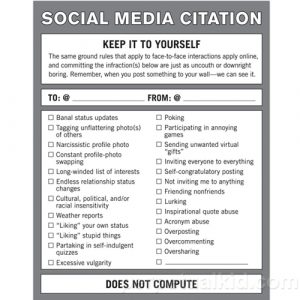I see that Facebook is experimenting with allowing you to pay a nominal fee to make sure that your posts end up “highlighted” over those of your friends’ other friends. That’s a whole new level of crazy… or is it?

I’m not on Facebook, but I think that this is a really interesting piece of news. The biggest thing that makes Facebook unusable (and which also affects Twitter) is that people will post every little banal thing that comes to their mind. I don’t care what you’re eating for your lunch. I don’t want to read the lyrics of some song that must have been written for you. I really can’t stand your chain messages (for a while there, after I hadn’t received any by email for a few years, I hoped that they’d died out… but it turns out that they just moved to Facebook instead). If you’re among my friends, I know that you have some pretty smart and interesting things to say… but unless I’m willing to spend hours sifting through the detritus it’s buried in, I’ll never find it.

But this might work. If the price sweet spot can be found, and it’s marketed right, then this kind of feature might make services like Facebook more tolerable. When you’re writing about a cute picture of the cat you’ve seen, that’s fine. And when you write something I might care about, you can tick the “this is actually relevant” box. You’ll have to pay a few pence, but at least you know I’ll see it. And if I want to churn through reams of “X likes Chocolate” (who doesn’t?) and “Y is… in a queue for the bus” then I can turn off the “only relevant things” mode and waste some time.
The problem is that the sweet spot will vary from person to person, and there’s no way to work around that. Big Bucks Bob can probably afford to pay a couple of pounds every time he wants to push some meme photo to the top of your feed, but Poor Penniless Penny can’t even justify ten pence to make sure that all of her friends hear about her birthday party.

It’s a pity that it won’t work, because a part of me is drawn to the idea that economic theory can help to improve the signal-to-noise ratio in our information-saturated lives. Turning my attention to email: of all the cost-based anti-spam systems, I was always quite impressed with Hashcash (which Microsoft seem to be reinventing with their Penny Black project). The idea is that your computer does some hard-to-do (but easy-to-verify) computational work for each and every email that it sends. But in its own way, Hashcash has a similar problem to Facebook’s new system: the ability to pay of a sender is not directly proportional to their relevance to the recipient. If my mother wants to send me an email from her aging smartphone, should she have to wait for several minutes while it processes and generates an “e-stamp”, just because – if it were made any faster – spammers with zombie networks of computers could do so too easily?
Yes, I just equated your social network status, about what you ate for your lunch, with spam. If you don’t like it, don’t share this blog post with your friends.
hashcash token: 1:20:120511:https://danq.me/2012/05/11/pay-to-post/::UVHo081pj6bSDWkI:00000000000001sxI
Do you still use IRC? I often think the chatter you see on a social network very much looks like what you see in any group chat environment – people post a mixture of interesting and banal things, I don’t see why you get so worked up about it. It’s easy enough to mute anyone or choose to subscribe just to ‘important’ updates from them (whatever they are). Facebook in general also does a fair job of bubbling up more interesting updates as they tend to have the most likes and comments.
Yes, I still use IRC virtually every day. But I can’t remember the last time that I had an off-topic conversation on there (that wasn’t a personal, one-on-one conversation). It’s almost as if everybody leaving and going to the social networks made things less-banal on IRC! I’ll tell you what, it’s certainly made things quieter!
That said: the idle chatter was never the major reason I left Facebook, anyway! (I still read people on Twitter who mostly post bollocks)
I guess I’m just an old fogey who pines for the days when the Internet was just a place for geeks to hang out, before we started letting these normal people onto it!
I think heuristics are going to be the next thing for this. Look at priority inbox, for example. It may not be perfect yet but it’s beyond spam detection (mainly based on who things are from) and into what you personally interact with most often. On Facebook you can already say “don’t show me this person’s updates ever again” but imagine if it could be more subtle than that, and learn from what you comment on and like. I’m sure they’re already working on it. I don’t like the economic model because of the obvious unfairness that creates. If you could get virtual currency a la stackoverflow for creating ‘liked’ content and rating others’ content well, that you can then spend on promoting your own stuff, that might solve it, with the addition of personal heuristics to customise.
I don’t fully understand why some don’t want targeted ads. I don’t want ads for things I don’t care about, but the more relevant the ad is the more likely it is to be useful rather than annoying! The idea that they are stealing your data is also prevalent, when really they are improving your experience *with* your permission. Sure, FB have definitely used it for unethical purposes but that’s an argument against the ethos of FB, not against the use of personal data to customise the experience of the user. That’s morally neutral.